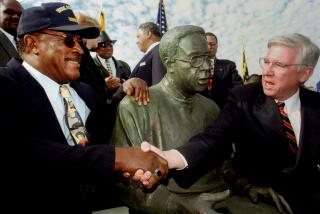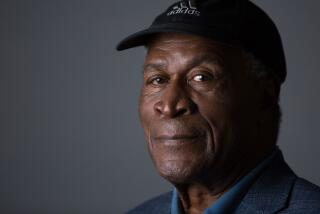How Far Has TV Come Since ‘Amos ‘n’ Andy’?
- Share via
Holy mack’rel, Andy! We’s all got to stick together in dis heah thing. . . . Remember we is brothers in that great fraternity, the Mystic Knights of the Sea.
--The Kingfish on TV’s “Amos ‘n’ Andy”
*
Here’s a little retrospective on “Amos ‘n’ Andy,” the antique comedy series driven from television in 1966 because it was deemed insulting to African Americans.
Why bring up “Amos ‘n’ Andy” now?
First, because the so-called black English spoken by most of the show’s African American characters bears at least a resemblance to Ebonics, the hotly contested hybrid condemned in some circles as nothing more than crippled grammar but favored in others as a language bridge to help some African American kids perform better in school and learn standard English.
And second, “Amos ‘n’ Andy”--which has come to symbolize the essence of TV bigotry in the medium’s first two decades--seems no more racially demeaning than some black sitcoms of the ‘90s sometimes do.
One significant difference: Whereas contemporary African American comedies have projected a variety of images, from derisive to uplifting, “Amos ‘n’ Andy” characters headed a very short list of blacks consistently visible on TV in that show’s era. Another of these was the heroine of “Beulah,” a stereotypical sitcom about a good-hearted black maid who was only moderately less bumbling than her white employers. Beulah’s boyfriend was shiftless, moreover, and her flighty best friend, Oriole, was also a domestic.
Just as Beulah’s roots were in radio, so, too, did “Amos ‘n’ Andy” start there, only much earlier. It began in 1928 as a series about African Americans in Harlem, created, written and starred in by Charles Correll and Freeman Gosden, a pair of white performers who posed for publicity photos and appeared in two movies as their characters in blackface. “Amos ‘n’ Andy” was hugely popular for years before moving its segregated universe to TV in 1951 minus Correll and Freeman, becoming the small screen’s first sitcom with a nearly all-black cast. NBC’s “Sanford and Son” became the second--21 years later.
Lambasted by the NAACP, “Amos ‘n’ Andy” was canceled by CBS in 1953 despite good ratings, then endured in syndication 13 more years before being banished from the airwaves when opposition from civil rights groups grew especially intense.
The TV series was much less about Amos (a gentle cab company owner played by Alvin Childress) and Andy (an amiable, thickish oaf played by Spencer Williams) than about Andy and George “the Kingfish” Stevens. Played by the especially gifted Tim Moore, the Kingfish was the show’s pivotal character, a conniving but endearing scam artist dedicated to relieving Andy--his best friend and best victim--of his money and constantly nagged by his shrewish wife, Sapphire (Ernestine Wade), and his despotic “mama-in-law” (Amanda Randolph), who lived with them.
The laughs usually came at the Kingfish’s expense, his schemes inevitably going awry and his “mama-in-law” always getting the last word in domestic disputes (“Shut up, baldy!”).
Other prominent characters included shifty, fast-talking lawyer Algonquin J. Calhoun (Johnny Lee) and Lightnin’ (Horace Stewart), the slow-moving janitor at the Mystic Knights of the Sea Lodge, where males in the series often hung out.
Many “Amos ‘n’ Andy” episodes are available on video. Pop in a cassette and you get some idea of why the series was so popular in its day, and also so loathed.
Here is Calhoun, for example, speaking from notes at a lodge banquet in honor of the Kingfish, a scene at once hilarious because he begins by mistakenly reading a funeral eulogy and offensive because his stereotypical dialect and language (this guy is a lawyer, no less) denigrates blacks as illiterate:
“You and me has always considered him one of our greatest friends. And I know that you all has loved him as much as I has. So now as we is all gathered here, prepared to lower this wonderful friend into his last resting place. . . .”
Not all African Americans in “Amos ‘n’ Andy” butchered the language. Strait-laced Amos, for example, was less stereotypical than his pals, and Sapphire spoke nothing like her husband. The show’s gnarled grammar and “dis” and “dat” black talk instead got lavished on the Kingfish, Andy, Calhoun and other characters designed to get the biggest laughs.
*
And even though “Amos ‘n’ Andy” depicted blacks in all areas of life, from lazy bums to educated professionals, rarely were they especially bright, with even the Kingfish, who gets credit at least for shrewdness, often appearing just a little bit slow.
But no slower--let’s zoom forward to present TV here--than the co-protagonists of WB’s “The Wayans Bros.,” one of the black series attacked recently by the Beverly Hills chapter of the NAACP. A recent episode found real-life brothers Shawn and Marlon thudding their way through another crisis--they mistakenly believed that their father was stepping out on their mother--with brotherly dialogue like this:
“The only thing we can do is confront Pop, and hope he give this lady up for the sake of da family.”
“What if dat don’t work?”
“The Wayans Bros.” doesn’t work at all. And then there’s Fox’s somewhat smarter “Martin,” another black comedy targeted by NAACP locals even though the national group has bafflingly granted the show’s star, Martin Lawrence, its coveted Image Award. In one at-times-funny episode from a previous season that was rerun recently, here was one of Martin’s pals in a dispute over who would be best man in his wedding: “Let’s don’t be arguing over no wedding.”
Martin agrees. “There ain’t gonna be no static.” And he adds: “We too tight for all dis, right?”
Ebonics or other language notwithstanding, what “Martin” also does from time to time is embrace another lingering, ugly stereotype by defining black males by their sexual apparatus. As does “Def Comedy Jam,” an HBO stand-up comedy series whose African American male performers usually pack their routines with crude sex jokes that spill out in street talk that sure sounds a lot like Ebonics and is aimed at their largely black audience.
Well, most “white” comedies are also doltish and banal, and even some of the smartest ones, such as NBC’s “Seinfeld” and “Mad About You,” are often about sex. The difference, however, is that whites aren’t facing the stereotypes that continue to confront African Americans, despite Bill Cosby and occasional other comedy entrepreneurs using TV to define other aspects of blackness.
The question is whether today’s buffoons are as damaging as yesterday’s buffoons. And whether some present black comedies in time will be remembered as the “Amos ‘n’ Andys” of the ‘90s.
More to Read
The complete guide to home viewing
Get Screen Gab for everything about the TV shows and streaming movies everyone’s talking about.
You may occasionally receive promotional content from the Los Angeles Times.






